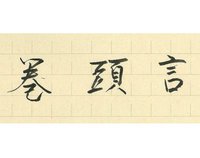父の存在
音元出版会長 和田光征の「巻頭言」2019年11月:音元出版での活動の根源となった父からの教育

令和元年7月27日の株主総会で、私の後継として52歳の永井光晴くんを社長に指名し、私は代表取締役会長に就任した。私が小社に入社したのが1968年4月、そこから51年の歳月が流れており、私自身は5月13日で75歳になっていた。
私が入社した1968年は、秋頃に会社が分裂して社員が辞めていった。残ったのは当時の岩間社長と奥様、そして短大卒の女子社員と私の4名だけだった。私も離反組から強力な誘いを受けたが、採用していただいた岩間ご夫妻に感謝の念がいっぱいだったので同意せず、何としてでもこの苦境を乗り越えたいと思っていた。
23歳だった私がなぜそう思ったかと言えば、残った4人で男性は社長と私だけ・・・。社長は病気がちで会社に来られないことが多かったからだ。自分が皆を支えなければと思ったのは、父の教育の影響が大きかった。私は少年の頃から、父親によく「頭がよくても人間ができていなければ駄目だ」と言われ、“人間性”について徹底的に教育された。九州人なので、いわゆる西郷南洲の教えそのものだった。私はその教えを守って行動し、それは今も変わらない。
私の家は9人兄弟だったので、子供の頃は学級費やPTA会費を工面するのも大変。父が部落を回って借金してくるため、お金のことは夜までに申告するのが決まりだった。ある日妹が登校する朝に申告して父から叱られた。父の複雑な顔を見て私は、畑を貸してほしいと言った。中学3年生の頃だ。カボチャを育てて売りに行くと言うと、長男が同じことをしていたので父は困った顔になったが、「兄さんの邪魔はしないよ」と言うと嬉しい顔をして、畑を4坪ほど貸してくれた。
大家族の実家では直径2mほどもあるちゃぶ台を囲んで皆で夕食をとっていたが、この頃私は畑の手入れに夢中になって夕食に遅れ、父や兄、姉がよく呼びにきた。夜の9時頃まで作業することもあった。私はカボチャを売って稼いだ金を父にすべて渡して、自分がとることはなかった。こういうところも、小社での私の行動規範になっている。
こんな私に父は目をかけ、西郷南洲の人間力の話をするようになってきたのだった。小さい頃から得意だった私の絵にも父は関心をもっていた。私も、どんな人に対しても優しく強い父を誇りに思っていた。
私が小学校5年生の頃のこと。父は民生委員をしていて、眼の悪い三浦さんという人に生活保護の手続きをしてあげ、大変感謝されていた。ある日父と歩いていて三浦さんと会った。「和田さんにはいつもお世話になっていますが、私は何のお返しもできません。今度の選挙で和田さんが推薦した人に投票します。こんなことしかできませんので教えてください」と言い、三浦さんは涙でいっぱいになっていた。
「三浦さん、私はあなたが決めた人に投票してくださればそれで満足です。選挙とはそういうものですよ」と父。三浦さんは声をあげて泣き、父はその肩を優しく抱いて励ましていた。その5年生の時に脳裏に刻まれた光景は、今でも忘れられない。私は父の存在をますます誇りに思ったのだった。
At a general meeting of shareholders held on July 27 of this year, 52-year-old Mitsuharu Nagai was appointed as representative director and president of Ongen Publishing, thus becoming my successor in that role. I became representative director and chairman. I joined the company in April 1968, so 51 years have passed since then. I myself turned 75 on May 13.
In the fall of 1968, the year when I joined, our company experienced a breakup when some employees left. There were only four of us remaining: then President Masatsugu Iwama, his wife, a female junior college graduate, and me. The breakaway group strongly urged me to join them, but I refused out of deep gratitude to Mr. Iwama and his wife for having hired me. At all costs, I wanted us to overcome those difficult circumstances.
It was largely the influence of my father’s teaching that made me, at the tender age of 23, think that way. Of the four of us remaining, only me and the president were men, and the president was often unable to come to the office due to sickness. I had to do my best to support us all. From my childhood days, my father used to tell me, “It’s no use being clever if you don’t have a well-rounded personality.” He thoroughly imbued me with a spirit of humanity. My father was a Kyushu man, and his thinking was just like that of the great Saigo Takamori, a leader in the establishment of the Meiji government in 1868 who also famously hailed from Kyushu. In 1968 I behaved in accordance with that way of thinking, and I still do today.
There were nine siblings in our family, so in my childhood my parents had a hard time raising tuition fees and parent-teacher association dues. Since my father had to go around the village asking for loans, it was a rule for us to declare anything related to money by evening. One morning, just as she was getting ready to go to school, my younger sister suddenly asked for money for some event and received a scolding from my father. Seeing my father’s bewildered look, I told him that I wanted to borrow a patch of land. I was in the third grade of junior high school at the time. When I said that I wanted to cultivate and sell pumpkins, my father looked disconcerted, because his eldest son was doing the same thing. But when I said that I wouldn’t be a nuisance to my brother, he brightened up and agreed to lend me about 13 square meters of land.
Ours was a large family, and we used to all sit around a low dining table measuring about two meters in diameter for our evening meal. Busy working on my patch of land, I was often late for dinner, and my father or a brother or sister would come out calling for me. Sometimes I worked in the field until around nine in the evening. I gave all the money that I earned from selling pumpkins to my father. I didn’t keep even a penny for myself. Again, that was to become my code of conduct in our company as well.
Watching me growing up, my father began to tell me about Saigo Takamori’s idea of resourcefulness. He also expressed interest in my drawing, which I was good at from a young age. I was very proud of my father, who showed kindness to others whoever they were and had a strong personality.
When I was in about the fifth grade of elementary school, my father served as a local welfare commissioner. Once he helped a chap called Miura-san, who had poor eyesight, to complete the procedures for livelihood protection, and Miura-san was extremely grateful. One day my father and I were out walking, and we bumped into Miura-san. Tearfully, Miura-san said, “Thank you for all your help, Wada-san. I haven’t been able to give you anything in return, but in the upcoming election I will vote for whoever you recommend. That’s the least I can do.”
“Miura-san,” my father replied, “I’ll be quite happy if you vote for whoever you want to. That’s what elections are all about.” When Miura-san burst into tears, my father gently embraced and encouraged him. I still haven’t forgotten that scene etched in the mind of a fifth grader. I remember feeling even more pride in my father.









